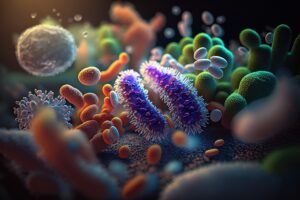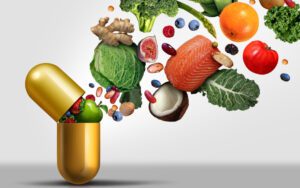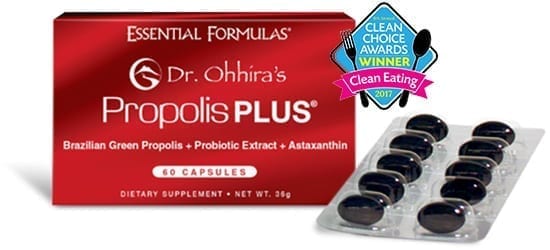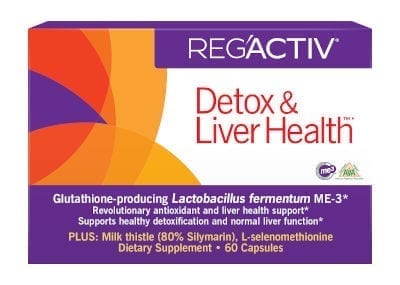The U.S. government estimates that as of 2021, there were about 57.8 million adults with mental illness in the U.S., representing 22.8% of all U.S. adults. Examples of mental health disorders include depression, anxiety, schizophrenia, eating disorders, and addictive behaviors.
While scientists agree that more research is needed, early small studies on probiotics and mental illness have shown promising results. It doesn’t seem logical that our gut could somehow impact our mental health, but that is what researchers are finding.
How the Gut and Brain Connect
Scientists sometimes call the gut our “second brain” because it contains its own nervous system and more than 100 million nerve endings. Scientists believe that the gut and its billions of bacteria, also called the gut microbiome, affect mental health. But why? Is there a connection between gut health and happiness?
Research has shown a symbiotic relationship between the brain and the digestive system. The gut-brain axis is an essential biochemical communication loop between the two.
This pathway allows two-way communication between the two organs so the brain can influence digestive activities and vice versa. In other words, the brain’s activity affects the stomach, and the gut plays a crucial role in certain brain functions, including mood regulation.
Scientists are finding that having a healthy gut that contains an abundance of diverse microorganisms can positively impact mental health. Likewise, someone with poor gut health due to probiotic deficiency is more likely to have mental health concerns.
Happiness Hormones
The human body relies on neurochemicals such as serotonin and dopamine (two happiness hormones) to relay signals from one part of the brain to another and send messages between the brain and the body. These chemicals are essential for the proper function of vital biological processes.
Researchers at the Catholic University of Leuven in Belgium found that most microorganisms in the belly produce many of the essential neurotransmitters needed for good health, including the mood-enhancing biochemicals we refer to as the happiness hormones. Researchers believe that the microorganisms in the gut produce about 95% of the body’s serotonin supply!
Serotonin, Dopamine, and Happiness
Serotonin and dopamine are neurotransmitters. They are called the happiness hormones because their release from the brain gives us the pleasurable feelings we associate with happiness, such as well-being, contentment, and satisfaction.
Seratonin
Serotonin is essential in stabilizing mood and stimulating happiness and well-being. Serotonin also affects the cardiovascular and endocrine systems and regulates functions such as sleep, memory, appetite, and learning. Those with insufficient levels of serotonin may become depressed or anxious and may have trouble sleeping.
Dopamine
Another happiness hormone, dopamine, regulates mood and feelings of pleasure, reward, and motivation. This neurochemical also influences motor control, digestion, heart and kidney function, decision-making, executive functioning, and more. When dopamine levels in the body are too low, you might feel less motivated to complete a project or not be able to enjoy an activity that once was pleasurable. Drastically low dopamine levels can cause severe disorders such as Parkinson’s or schizophrenia.
Probiotics and Neurotransmitters
Scientists recognize a relationship between probiotics and mental health because these important neurotransmitters are produced in the brain and gut, enabling communication via the gut-brain axis. We need a healthy balance of probiotics in the gut to maintain healthy digestion, a robust immune system, clear skin, and vital mental health.
Our digestive system contains billions of beneficial and harmful microbes, including bacteria, yeasts, and fungi. As long as there is an appropriate ratio between the good and bad organisms, the microbiome remains balanced, and good health persists. However, suppose dysbiosis occurs, and the harmful organisms in the gut no longer remain in check. This can lead to a weakened immune system, digestive upset, and mental health concerns, among other problems.
Bringing Back the Balance
Researchers believe that adding probiotics back to the gut restores balance when the gut microbiome is disrupted by poor diet, lack of sleep, stress, illness, medications, or other causes. One way to replace beneficial bacteria in the gut is to eat probiotic-rich foods. Some examples include fermented dairy products such as kefir and yogurt; fermented soybean products like miso, tempeh, and natto; and fermented vegetables such as sauerkraut, kimchi, and pickles.
If restoring balance to the microbiome is the goal, getting a wide variety of microorganisms is essential. This can be difficult to accomplish through diet, particularly if fermented items are not high on your list of favorite foods. And remember that to receive benefits from probiotic foods, they must contain live microorganisms. Unfortunately, the pasteurization process in food production usually kills food probiotics, so do your homework.
A more straightforward way to get the probiotics needed, keep harmful bacteria in check, and promote optimal brain health is to take a probiotic supplement. A single supplement, such as Dr. Ohhira’s Probiotics, can restore a diverse assortment of beneficial organisms to the gut to help restore balance in the microbiome.
Probiotics and Mental Health
Research into probiotics’ effects on mental health is in its infancy, but few human studies and several animal studies have indicated mental health improvement with probiotic use. Probiotics are not a miracle cure for mental health problems, but in partnership with your doctor, they can be a helpful addition to your treatment plan.
- Mood – A 2019 study of probiotics’ effects on healthy young adults increased healthy college students’ ability to regulate negative mood, panic anxiety, and worry
- Stress – A 2021 study showed a potential link between probiotics and stress and anxiety alleviation
- Anxiety and depression – In limited studies, researchers found that probiotics may improve symptoms of anxiety and depression in clinical patients
- Major depressive and bipolar disorder – A study found that depressed subjects had lower microbial diversity and probiotics containing Bifidobacterium and/or Lactobacillus spp. seemed to improve depressive symptoms
- Cognitive function – A 12-week study on patients with mild to moderate Alzheimer’s Disease indicated that probiotic treatment had beneficial effects on those patients’ cognition status
- Gut inflammation and mood – Studies have linked gut inflammation and dysbiosis to anxiety and depression. Probiotics have a potential role in restoring microbial balance in the gut, reducing inflammation, and helping prevent anxiety and depression
Natural Remedies to Increase Happiness
While medication and, potentially, probiotic treatment can improve your overall mood, there are other actions you can take to feel happier every day.
Get Enough Sleep
No matter what anyone says to the contrary, most adults need at least seven hours of sleep each night. If you’re constantly cheating yourself on sleep, you may be putting yourself at risk for chronic conditions like depression, diabetes, and heart problems. How can you have better quality sleep? Here are a few suggestions:
- Get at least two hours of bright light exposure during the day
- Reduce blue light exposure at night
- Avoid caffeine at least six hours before bedtime, or switch to decaffeinated later in the day
- Go to bed and get up at the same time each day
Exercise
We’re not talking about training for an Iron Man or extreme rock climbing. We’re talking about adding physical activity to your daily routine. Even a small amount of exercise can reduce anxiety, stress, and depression symptoms. Here are a few suggestions to get going:
- Set aside a half hour each day in the morning, at lunch, or in the evening to take a brisk walk. Consider walking with a partner for greater motivation
- Find an in-person or online yoga class for its physical and mental benefits
- Search for fun activities that are also active, such as dancing, hiking, or swimming
Eat for a Positive Mood
You don’t have to completely overhaul your eating to see the benefits of a better diet. Here are a few suggestions of foods you can gradually add to your diet for a better mood:
- Lean, high-protein foods like poultry, legumes, meat, and dairy help boost concentration and energy
- Add in complex carbs for fiber and their ability to generate the feel-good hormone, serotonin, avoiding simple carbs like sugar and refined starches that can lead to physical and emotional crashes
- Fatty fish has omega-3 fatty acids that have anti-inflammatory benefits and improve overall brain health
- Avoid foods that bring your mood down, such as anything processed or deep-fried
Daily Practices for Greater Happiness
Happiness is essentially an inside job, and specific daily practices can enhance it. Here are a few:
- Mindfulness – Mindfulness is about being present in the moment. Being present takes us out of the past we can’t change and removes us from anxiety about the future, which we also cannot change
- Gratitude – A little focus on gratitude first thing in the morning instead of mulling over our problems goes a long way toward shifting from feelings of lack to an attitude of abundance
- Breathe – We often breathe shallowly, slumping over in our work chairs or our cars rushing to get through rush hour traffic and pick up kids. When you feel stressed, find a moment to stop, close your eyes, and inhale to a count of five, then exhale to a count of five several times
Frequently Asked Questions
How long does it take for probiotics to work on mood?
Everyone’s microbiome is different. You should not expect to experience benefits from taking a mood-boosting probiotic within a specific time frame. Some people might notice an improvement in mood or overall health after a few days of taking a probiotic supplement. Others may not see an improvement until they take a supplement for several months.
Do probiotics increase dopamine and serotonin?
Research has not yet proven a direct correlation between using supplemental probiotics and neurotransmitters like dopamine or serotonin in humans. Laboratory research has shown that L. plantarum increases serotonin and dopamine levels in mice and reduces their anxious behavior. A research study also found that L. plantarum increased serotonin and dopamine levels in mice and decreased anxious behavior.
Do probiotics help neurotransmitters?
The gut microbiome produces a good portion of the body’s neurotransmitters. An unhealthy, out-of-balance gut may struggle to produce neurotransmitters, while a healthy gut with a diverse population of microorganisms will be better able to perform this function.
A study published in Nature Microbiology found that those suffering from depression lacked two distinct organisms in the microbiome: Coprococcus and Dialister. The researchers are careful to say this one study does not prove that being deficient in these organisms causes depression. More research is needed to determine the role these two organisms play in mood regulation and the creation of neurotransmitters.
Mood-Boosting Probiotics
The volume of data that supports the relationship between a healthy microbiome and better mental health continues to grow, along with knowledge of the relationship between gut health and the production of essential neurotransmitters. While research that ties an increase of specific happiness hormones to probiotic-rich foods or supplements is just beginning, indications are that gut health has a definite impact on mental health and happiness.
A Few Final Words About Probiotics and Happiness
So, can probiotics make you happy? Many people add probiotics to their diets and see a difference, and many enjoy better health after adding a probiotic supplement. They experience less gas, bloating, fatigue, headaches, and other symptoms of an unhealthy gut.
If you have been considering adding a probiotic supplement to your routine, Dr. Ohhira’s probiotics are an excellent choice. Dr. Ohhira’s supplements are the only probiotics fermented for three years using all-natural ingredients like fruits, vegetables, pure spring water, and seaweed. And they are non-GMO and 100% vegetarian.
For a probiotic supplement that supports whole-body physical and mental health, try Dr. Ohhira’s probiotics today. They contain multiple strains to improve gut biome diversity. Learn Why Dr. Ohhira’s probiotics are the choice of many clinical nutritionists. Discover the Dr. Ohhira Difference.
- https://www.nimh.nih.gov/health/statistics/mental-illness
- https://www.mayoclinic.org/diseases-conditions/mental-illness/symptoms-causes/syc-20374968
- https://www.health.harvard.edu/mind-and-mood/probiotics-may-help-boost-mood-and-cognitive-function
- https://www.sciencedirect.com/science/article/abs/pii/S016503271831944X
- https://pubmed.ncbi.nlm.nih.gov/33511258/
- https://pubmed.ncbi.nlm.nih.gov/34620373/
- https://pubmed.ncbi.nlm.nih.gov/35010912/
- https://www.ncbi.nlm.nih.gov/pmc/articles/PMC5641835/
- https://www.healthline.com/health/how-to-be-happy#daily-habits
- https://www.healthline.com/nutrition/17-tips-to-sleep-better#4.-Reduce-irregular-or-long-daytime-naps
- https://essentialformulas.com/shop/
- https://essentialformulas.com/product/dr-ohhiras-probiotic-supplements/
- https://essentialformulas.com/dr-ohhira-difference/





